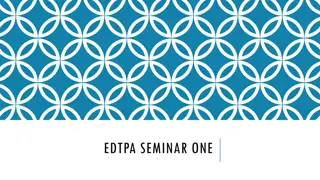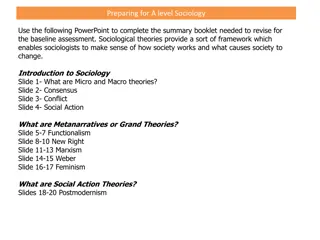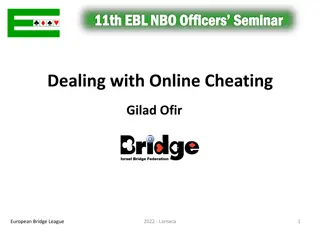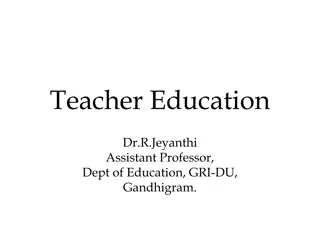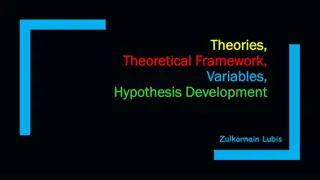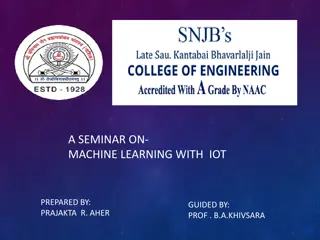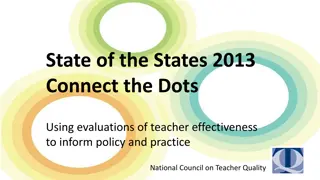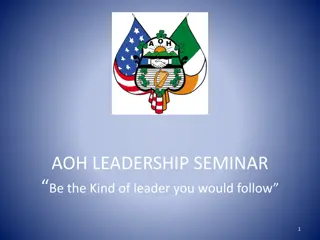Online Seminar: Theories of Learning in Initial Teacher Education
This collection of online seminar slides introduces pre-service teachers to major theories of learning, including the Science of Learning through cognitive neuroscience. The presentation aims to help educators consider implications for teaching, recognize theories in action, and pose critical questions. Various perspectives on learning are explored, emphasizing the importance of understanding how children learn to inform effective planning and teaching practices. The content includes learning theory examples, intended learning outcomes, different perspectives on learning, and tasks for participants to engage with and apply these theories in educational contexts.
Download Presentation

Please find below an Image/Link to download the presentation.
The content on the website is provided AS IS for your information and personal use only. It may not be sold, licensed, or shared on other websites without obtaining consent from the author. Download presentation by click this link. If you encounter any issues during the download, it is possible that the publisher has removed the file from their server.
E N D
Presentation Transcript
These slides provide an example of an online seminar for pre-service teachers introducing Theories of Learning that includes Science of Learning (cognitive neuroscience) as one lens among others for understanding learning. This presentation is part of a collection of resources for initial teacher education. The other resources can be found on our website. https://www.bathspa.ac.uk/projects/learning-sciences-in-teacher-education/ and permanently on BathSpa Data. Please adapt it for your own educational purposes.
Theories of Learning Image credit: Parish, Bunny. bp019.jpg. 1956. Pics4Learning. 12 Jan 2021
Intended Learning Outcomes To consider implications for teaching and learning To introduce and pose questions about major theories of learning To recognise learning theories in action
Different perspectives on learning 1. A change in behaviour as a result of experience or frequent practice 2. To gain knowledge of, or skill in, something through study, teaching, instruction or experience 3. A process by which behaviour is changed, shaped and controlled 4. The individual process of constructing understanding based on experience from a wider range of sources 5. A cognitive process that enables us to store, retrieve, process and use information and develop skills Adapted from Pritchard (2018)
How do we understand learning? Learning is a natural process. Yet, understanding how we learn is not so straightforward. (Wray, 2018, p66) Theories of learning have developed from a range of perspectives: educational, social, cultural, psychological, neurological Their purpose is to help us understand how children learn and therefore to help inform planning and teaching.
Theories of learning Behaviourism Cognitive Constructivism Social Constructivism Socio-Cultural Constructivism Science of Learning
Task 1. You will be allocated a room 2. In your room you will watch a short video about one learning theory/theorist 3. There is information on each learning theory for you to engage with 4. As a group decide the key messages about that theory, how it may help us understand learning and how it applies to classroom practice 5. You will then work as a team to prepare a sketch of an interview a. One or two people take on the role of the key theorist/s b. Others can be specialists in this theory c. One person acts as the interviewer
Reflecting on You as a Learner What did you learn? How did you learn? On your own or with others? How did you know? What did you find difficult? How did you overcome any barriers? What would your next steps be? Begin to think about what role learning plays in your role as a teacher.
Key Messages Learning theories are frameworks developed from a wide range of perspectives Five main theories to explore for your starting point: Behaviourism Cognitive Constructivism Social Constructivism Socio-cultural Constructivism Science of Learning There are many connections between the theories Used by teachers to understand children s learning and to plan for progress Exploring and recognising children s learning is the focus for an assignment.
References Unit 2.2 Wray D. (2018) Looking at Learning in Cremin, T. and Burnett, C. Learning to Teach in the Primary School (4th Ed) London: Sage Pritchard, A. (2018) Ways of Learning: Learning Theories for the classroom. London: Routledge.






